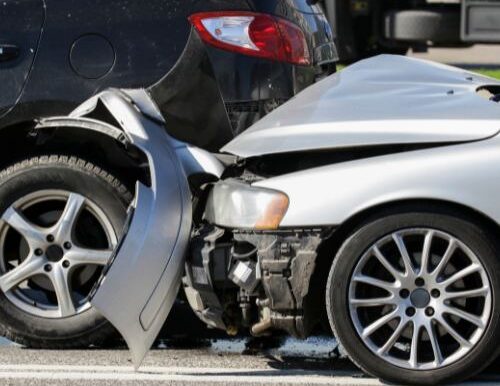
- Vaughn A. Wamsley
- Car Accidents
Every car accident is disruptive, but for some, it’s life-altering. One moment you’re on your way to work or running errands, and the next, you’re in a hospital bed facing injuries that prevent you from earning a paycheck.
For many of our clients at our Indianapolis accident law firm, this isn’t just about physical healing—it’s about how to pay the bills, support a family, and maintain financial stability in the wake of trauma. If you can’t work after a car accident, we’re here to help you understand your rights, your options, and the steps to take to secure compensation.
As a trusted car accident lawyer in Indianapolis, we’ve seen firsthand how much stress victims are under when their livelihoods are threatened. Let’s break down what you need to know.
The Hidden Financial Toll of a Car Accident Injury
Lost income is one of the most immediate and stressful consequences of a serious car accident injury. For example, if a person breaks a leg and can’t perform their job duties for several weeks—or even months—they’re not only dealing with pain but also the loss of income and benefits.
In Indiana, the median household income is roughly $70,000 per year. Missing even a few paychecks can throw your financial stability into chaos, especially when combined with mounting medical expenses.
Many accident victims in Indianapolis also face long-term or permanent disability. According to the CDC, roughly 2 million Americans suffer permanent injuries from car crashes each year.
Some individuals can never return to their original line of work or must transition to lower-paying jobs. Whether you’re missing work temporarily or are no longer able to earn what you once did, you deserve fair compensation. As an Indianapolis auto accident attorney, we help clients calculate their total losses, not just the obvious ones.
Lost Wages: What Can You Recover?
Indiana law allows accident victims to pursue compensation for lost wages, both past and future, through a personal injury claim. This includes not just what you’ve already missed but what you’re expected to miss going forward, particularly if your injury prevents you from returning to your old job or from working at all.
Recoverable damages for lost income may include:
- Wages you’ve missed since the accident
- Sick or vacation time, you were forced to use
- Missed bonuses or commissions
- Reduced earning capacity if your injuries are permanent or long-term
- Loss of future earning potential in your field
To recover these damages, you’ll need documentation. Our Indianapolis accident law firm works closely with clients to obtain pay stubs, tax returns, employment records, doctor’s notes, and statements from employers. We also consult economic experts when necessary to calculate future earnings and ensure that nothing is left out of your claim.
Can You Receive Disability Benefits?
In some situations, especially if your injuries are severe, private disability insurance or government benefits may also be available to help you stay afloat. While filing for these benefits doesn’t prevent you from pursuing a personal injury claim, it’s crucial to understand how they work.
Short-Term Disability (STD) coverage, which is sometimes provided by employers or purchased individually, typically replaces a portion of your wages for up to six months. If your injuries are more serious, Long-Term Disability (LTD) benefits may kick in after that period. LTD benefits in Indiana often cover 50-60% of your income and can last for several years, depending on the policy.
You may also qualify for Social Security Disability Insurance (SSDI) or Supplemental Security Income (SSI). To be eligible for SSDI, your injury must be expected to last more than a year or result in death, and you must have paid into the Social Security system. SSI is available to individuals with limited income and resources, regardless of work history.
We often help clients navigate both personal injury claims and disability benefit applications simultaneously. The process can be overwhelming, but our legal team helps ensure that all paperwork is completed accurately and deadlines are met.
The Importance of Medical Evidence
To receive compensation for lost wages or disability, medical documentation is essential. Insurance companies won’t take your word for it—they need objective proof from medical professionals. That’s why it’s crucial to follow up on all doctor visits, attend physical therapy sessions, and follow your treatment plan. Gaps in treatment or non-compliance with medical advice can be used against you during negotiations or a trial.
Our role as your accident lawyer in Indianapolis, IN, includes collecting detailed medical records, securing written statements from treating physicians, and ensuring that your injuries are connected to the accident. This documentation supports both your short-term claims and long-term financial recovery.
What About Self-Employed Individuals?
We work with many freelancers, contractors, and small business owners throughout Indianapolis who face unique challenges when they are unable to work. Unlike salaried employees, self-employed individuals often don’t have sick leave or employer-provided disability coverage. Their income may vary from month to month, making it more challenging to prove losses.
However, you still have the right to recover lost income. We may use your business tax returns, 1099 forms, client correspondence, invoices, and profit and loss statements to show how the accident directly affected your earnings. As an Indianapolis auto accident attorney familiar with these complexities, we know how to build a compelling case for self-employed clients.
How Insurance Companies Undervalue Lost Wage Claims
Even if the other driver’s insurance company admits fault, don’t expect them to pay out the full value of your lost wages willingly. Insurers often downplay the extent of your injuries, question whether you needed time off, or suggest that your wage loss is exaggerated. They might offer a lowball settlement that barely covers your immediate medical bills, let alone your lost income or future career limitations.
This is where our Indianapolis accident law firm comes in. We take over all communication with the insurance companies, negotiate aggressively, and fight for every dollar you’re owed. If they refuse to offer a fair settlement, we’re ready to take your case to trial.
Understanding Indiana’s Comparative Fault Rule
Indiana follows a modified comparative fault system, which could affect your ability to recover damages. Under Indiana Code § 34-51-2, if you’re found to be 51% or more at fault for the crash, you can’t collect damages. If you’re 50% or less at fault, your total recovery will be reduced by your percentage of fault.
For example, if your total damages are $100,000 but you’re found to be 20% responsible, your compensation will be reduced to $80,000. Insurance companies often use this rule to try to shift blame and minimize payouts. We work hard to investigate the accident, gather evidence like traffic camera footage and witness statements, and counter unfair claims of shared fault.
What If Your Injury Leads to a Career Change?
Some accident victims can return to work, but in a reduced capacity. A construction worker with a spinal injury might not be able to perform heavy lifting but could transition to a desk job, likely at a lower salary. In these cases, you can seek compensation for diminished earning capacity. We engage vocational experts to assess your limitations and compare your pre-accident and post-accident career prospects.
If retraining or certification is needed for a new profession, those costs may also be included in your compensation. Our Indianapolis auto accident attorneys know how to present these future losses clearly and convincingly.
How Long Do You Have to File a Claim?
Under Indiana Code § 34-11-2-4, the statute of limitations for personal injury claims is two years from the date of the accident. That means you must file a lawsuit within that window or lose your right to compensation. While two years might seem like ample time, the process of gathering medical evidence, calculating lost income, and negotiating with insurers can take several months.
It’s best to speak with an accident lawyer in Indianapolis, IN, as soon as possible. The earlier we get involved, the more effectively we can preserve evidence, document your injuries, and protect your financial future.
FAQ: What Happens If You Can’t Work After a Car Accident?
Can I use my paid time off or sick leave and still be eligible for compensation?
Yes. If you’re forced to use your PTO, sick leave, or vacation days because of your injuries, you can seek reimbursement for that lost time as part of your personal injury claim. The law treats this the same as lost wages because you were deprived of benefits you earned through your employment.
What if I was between jobs when the accident happened?
Even if you were unemployed at the time of the crash, you may still have a claim for lost earning capacity. For example, if you have recently been hired or are actively job-seeking, we can use your past income history and job offers to estimate your economic losses. Courts consider your work history, qualifications, and efforts to find employment when evaluating your claim.
What if my employer fired me because I couldn’t return to work fast enough?
Employers generally cannot fire you solely because you were injured in a car accident. If your termination was unjust or retaliatory, you may have grounds for a separate employment law claim. Even if the termination was legal, you can still pursue compensation for the income you would have earned if you had not been injured.
Can I get compensation if the accident aggravated a pre-existing condition?
Yes. Indiana law allows you to recover damages if a car accident made an existing injury or medical condition worse. You’ll need medical documentation showing how the crash impacted your condition. Our legal team can help you gather this evidence and prove the worsening of your health was due to the collision.
Let us know if you need answers to more specific questions about your unique situation. We’re here to help.
We’re Committed to Helping You Recover After a Car Accident
If a car accident has robbed you of your ability to work, we’re here to fight for the justice and compensation you deserve. At our Indianapolis accident law firm, we believe no one should have to choose between healing and paying the bills. We understand the fear, the stress, and the uncertainty—and we know how to help.
Every case we take is personal. We’ll review your situation, explain your options, and create a legal strategy designed to recover everything you’ve lost. Whether through a settlement or at trial, we’re committed to pursuing the best possible outcome for you.

